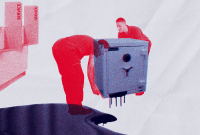Support strong Canadian climate journalism for 2025
I’d been treesitting in protest of the Trans Mountain pipeline expansion (TMX) for months. While my friends and I were literally holding the fort, conservationists were doing critical work on the ground.
In April 2021, a group of bird watchers alerted federal wildlife officers to the presence of hummingbirds in the area where we were treesitting, and under the Migratory Birds Act, construction of the pipeline was halted until Aug. 21.
This victory began a short era of peace. Security left the area. The forest was in full bloom. I remember sitting in Hummingbird watching fellow treesitter Dr. Tim Takaro lying in the bright green moss below, hands behind his head, grinning from ear to ear. An Indigenous man within the Stop TMX community told me hummingbirds could fly backwards and forwards, bringing messages from the spirit world. This victory seemed like a fortuitous omen.

Not long after the victory, I left for three months to volunteer in northern B.C. with the Wet’suwet’en Nation. Upon my return, I was afraid I’d find the treesit gone, but to my relief, I discovered our occupation was still there. Additionally, Timothée Govare, my tree-climbing mentor, was true to his word: he had built a second treehouse, Bluejay, in a cottonwood tree directly across from Hummingbird. A long and very precarious rope bridge connected the two.
But TMX had expanded in lockstep. From the top of Hummingbird, bald spots were visible where the pipeline’s construction was advancing.
Among all the changes I discovered upon my return, the biggest one was in myself. My early involvement with the treesit had transformed me into someone competent, confident and positive. But the heat dome and subsequent climate anxiety had rendered me fearful once more.
The last time I visited the tree, giant spotlights were erected at its base. The security guards didn’t stop us from ascending, but it was clear they were closing in.

One day, Timothée lowered himself onto a precarious line cast between two trees in direct defiance of an oncoming tree cutter. The tree cutters couldn’t advance any further without risking injury to him. They were forced to retreat.
Only a few days later while Timotheé was belaying between trees, a limb fell and injured a TMX worker. Although Timotheé didn’t knock the branch loose, he was forced to come down or face charges of assault. When police had cleared the tree sitters, the machines rolled in.
For a year, the treehouses stood as a beacon of resistance to the TMX pipeline expansion. The ruthlessness with which we were swiftly overpowered left the team and me devastated. If all this work could be wiped away by a handful of executive orders and a dozen men, our efforts would have to double and our numbers would have to triple.
My friends and I coped with the loss of the trees in our own ways. Timothée and our mutual friend and tree climber Amanda Hehner took off to the backcountry for a while. They invited me to come along, but I declined. I was red hot with anxiety and didn’t want to be reminded of the treesit at all.
For weeks, our group dispersed. And then, kind of like hummingbirds returning after migration, we all got back to work.
The future
On Feb. 16, I went to the B.C. Supreme Court to watch 21-year-old Zain Haq and 69-year-old William Winder be sentenced for obstructing the TMX pipeline.
William had affixed himself to a tree on the Trans Mountain worksite with a bicycle U-lock, delaying work for hours. Zain had sat on the TMX thru-way and refused to move. Even without being secured into a “hard lock” — the kind that needs special equipment to remove — TMX had to cease work while Zain was arrested. Both Zain and William had been called to action by the urgency of the climate crisis.
In her judgment, Justice Shelley C. Fitzpatrick said the defendants expressed “passionate views about the environment.” She then proceeded to sentence William to 21 days in jail and Zain to 14.
A few months later, Dr. Takaro was sentenced to 30 days in jail for his protests against the pipeline.
When I asked Timothée what brings him hope, there was a pause before he responded. “It’s hard because it’s pretty dark, y’know? I really feel we’re going for massive catastrophes … even if we do take a lot of action,” he said.
“But I’m not going to go down without a fight. Action gives me hope. You really feel hopeless when you don’t do anything. As soon as you do something … that gives you hope. Very often when you try something, it has more of an impact than you think… I thought they would take us (out of the trees) in three days… We were there for almost a year.”

I have no doubt the activists who fight for justice have a stronger spirit than the corporations that peddle pipelines. But witnessing the treehouse falling shone a light on the smallness of our operation. We were a dozen or so activists maintaining a treesit in our spare time. TMX is a multimillion-dollar corporation backed by the Canadian government. The people who cut down our trees and replaced them with steel pipes were paid a salary. They had pension plans and an established chain of command.
Challenging the status quo required massive sacrifice. It meant we, as activists, had to put our lives on hold and dedicate our time to something greater than ourselves. Once-a-week Zoom meetings weren’t going to cut it. The occasional protest or publicity stunt was too quickly forgotten. Unless we can rise up and organize to a level that matches the effortless progression of the status quo, corporate hegemony will keep lurching forward, like a chicken without a head.
There are about as many excuses for inaction as there are parts per million of carbon in the atmosphere.
“The government is taking care of it.” (They’re not.)
“It’s too late to do anything anyway.” (It’s not.) And even if it was, shrugging ourselves into submission would be missing the point: fossil fuel expansion during a climate crisis is wrong. Ignoring Indigenous dissent is wrong. Prioritizing profit over life on Earth is wrong. No matter how dire or bleak reality is, if you need a reason to fight, fighting for what is right will always be reason enough.

“I’m too old to make a difference. It’s up to you young folk” is something I’ve commonly heard. But I’ve met activists who are in their teens and ones who are in their 70s. There is no age limit to involvement.
The extent to which we fight will define the coming century. There are countless levels of involvement and countless ways to be involved. The easiest way is to make a monetary donation to an Indigenous-led group right on the front lines. The Tiny House Warriors is a good place to start.
If you want to become actively involved as a volunteer, Protect the Planet and Stop TMX can be reached here. Bird watchers and biologists have had lots of success slowing down the pipeline, too. Most recently, a woodpecker halted construction.
If you’re a young person or you have a penchant for the absurd and funny, check out a group I started: T-Rex Against TMX.
What's critical is understanding this fight isn’t just about checks and balances. Money in and carbon out. Deadlines and data trends. It is about ethics. It is about what is objectively, scientifically and morally correct.
The Trans Mountain pipeline expansion needs to end. Fossil fuel expansion needs to end. No matter who you are, no matter your work, no matter your politics, no matter your capacity, this is a fight that demands your participation.
Emily Kelsall is a writer and activist from Squamish territory.






Comments
A hugely inspiring piece that captures what is needed perfectly.
“The government is taking care of it.” (They’re not.)
The worst one I've heard is, "I don't have kids, and aren't going to, and I'll be dead by then. So I don't care."
Knowing where it came from, though, I think it came from a place of hopelessness, given that industry, banks and governments are all voting against the climate.